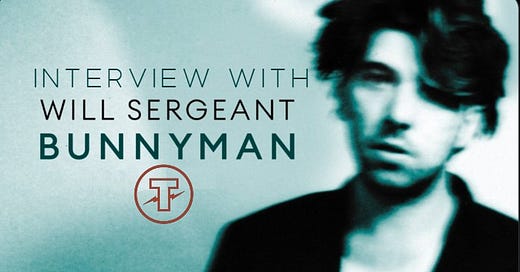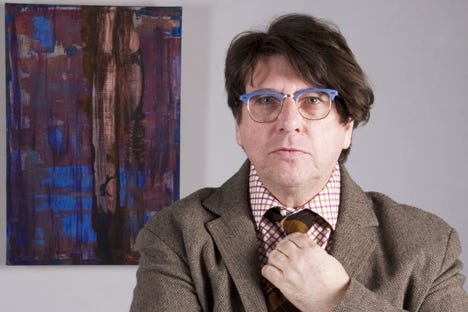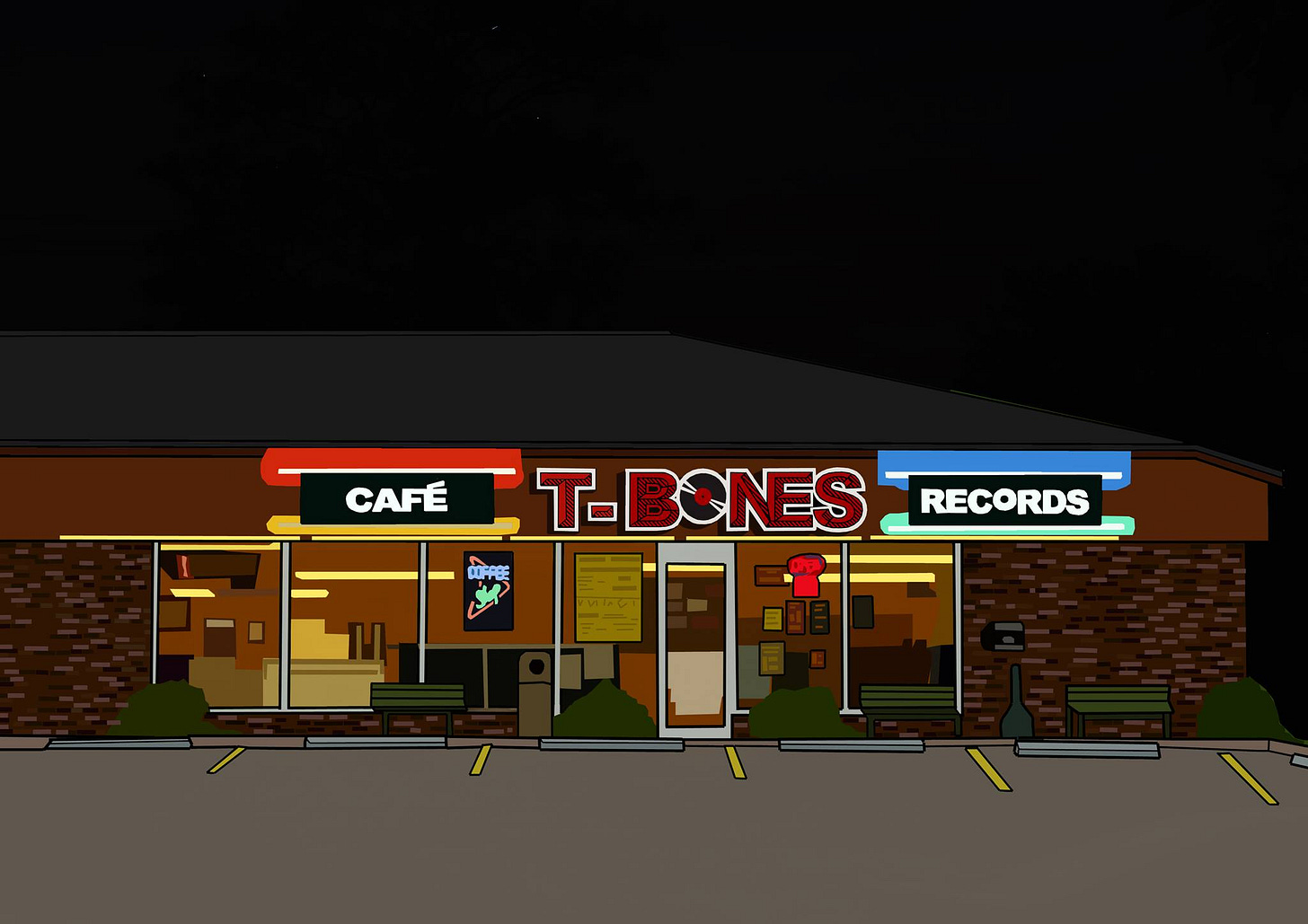INTERVIEW with WILL SERGEANT - BUNNYMAN
As a founding member and guitarist for Echo and The Bunnymen, Will Sergeant defined the guitar sound of the Eighties and pushed the band to the pinnacle of Post-Punk.
Robert Smith calls Will Sergeant "a true original." Courtney Love says Sergeant is "a sonic master of the universe." As a founding member of Liverpool's legendary Echo and The Bunnymen, Sergeant's mixture of chiming, bright guitar, and atmospheric effects defined the guitar sound of the 1980s. Outside of thirteen albums with The Bunnymen, Will has also released four albums of instrumental experiments and held solo art shows in Los Angeles and his home of Liverpool. Third Man Books will be releasing his autobiography "Bunnyman: Post-War Kid To Post-Punk Guitarist of Echo And The Bunnymen" here in the US on November 16th where he details his early life and how music influenced the rest of his life.
T-BONE'S RECORDS: In a thumbnail sketch, describe the Liverpool of your childhood. Surely, living in the shadow of the world's most famous band pushed lots of people into music - but what did you hear (or who did you see) that really cemented this is what you wanted to do?
WILL SERGEANT: The Beatles' music flows through the city’s streets like rain washing away the pain of life. It is difficult to ignore. It’s now seen as a way to attract tourists. In the 80’s it wasn’t as commercialised...yet it was pretty much the only thing Liverpool was known for and LFC of course. It was punk rock that gave me the desire to buy a guitar and to start a band. So, it was all the first wave of punk bands Ramones, The Fall, Talking Heads, Television, Wire, Suicide, the Pistols etc.
T-BONE'S RECORDS: What were you playing before you met and started collaborating with Ian? The documentaries always make it feel like Eric's was the place to be, but musically I get the feeling everyone was really creating more at home - and then Eric's would be sort of the "proving ground" for songs, ideas, persona, and more.
WILL SERGEANT: I was making my own tapes and learning the guitar kind of experimenting. In quick succession, I bought a Fender 12 string acoustic and a Fender Telecaster. I liked the shape of it was as simple as that and Wilco Johnson played a Telecaster. That became the thin sound of early Bunnymen records. I also bought a drum machine that I had spotted in the local music shop Rushworth’s. I had no idea about music or guitars. I learned everything from a small book, just a pamphlet really. It had diagrams in it, where to place your fingers to make specific chord shapes. I would change from one shape to the next. Some of the progressions sounded nicer than others. I would play them to Mac and we would work on them together, with his input they became our early songs. "The Pictures on my Wall", "Villiers Terrace," "Stars are Stars," etc. Just sketches that we would record onto cassettes mainly as a way for me to remember them. Then when Les joined us, we would jam a lot and build up songs that way.
T-BONE'S RECORDS: Those first recordings with you, Ian, and Les - do you remember the feeling of excitement? Is it safe to say that you were trying to sort of "bottle" it and take it to Eric's for that first show opening for Teardrop Explodes (and you played just one song for 20 minutes - is that correct?)
WILL SERGEANT: We played a very early version of "Monkeys." It was a simple thing but that’s what we were all about back then so to us it was a fantastic spacey sound. We played it for 12 minutes. Everyone watched till the end of the song and then we walked off the stage. All our Eric's mates loved it and then suddenly, we felt indestructible it was an amazing feeling of relief and elation, also an arrogant pride that we were the most important band on the planet from that moment on.
T-BONE'S RECORDS: Was this around the same time you made "Weird as Fish?" Was it your love of instrumental music that led to you finding that unique chiming/delay sound? Who would you say your first influential guitar players were?
WILL SERGEANT: I love all kinds of music not just instrumental. I am a massive Brian Eno fan and have been following him since his Roxy Music days. He always seemed to be the most interesting member of that band and his lack of musical ability at that time was what made me think… I could do that. I can mess around with a drum machine and a tape recorder. And I began to make cassette tapes of experimental stuff inspired by Eno and the Residents.
T-BONE'S RECORDS: How do you remember the evolution from the 1978 gigs to the first single/Peel Session to "Crocodiles" in 1980? When I put them all together, I hear you all coalescing into this "monolithic Psychedelia" - is that what you might have been after as Post-Punk was quickly defining itself around you?
WILL SERGEANT: In the beginning, I was not very adept as a guitarist and always looking for the easy route to take. This simplistic approach and my love of the Indian scale led to me getting a psychedelic tag. Norman the DJ from Eric’s club in Liverpool would play the odd psyche classic off the Nuggets compilation LP’s, The Electric Prunes, the Seeds, etc. So the underground music from the ’60s was filtering in that way too, plus I had grown up with most of my friends in the village being into the trippy hippy way of life so out there music was in me from the get-go.
T-BONE'S RECORDS: 'Heaven Up Here" seems to reflect more of your live energy. Where "Crocodiles" is sort of hazy and mysterious, your sound on "Heaven" is very tight and tough. I especially like how "Over The Wall" is both twangy and then you slice right through the mix. As you were writing and playing were you creating these ideas in the studio while tracking the album?
WILL SERGEANT: I was trying to get that Duane Eddy twangy sound like you rightly spotted to slice through the backing track. Duane Eddy twang is not that easy on a Telecaster or a Jaguar guitar. I should have had a Gretsch, but I knew nothing of such things back then. I wanted it clear and not too distorted. Distortion seemed to be the sound of the past the heavy bands that punk rock was the enemy of. I liked it crisp and bright, and this came from the Fall and Talking Heads. I was very young and had no real experience of music or how it works it was all done instinctively we felt we knew what was right. Ian Broudie produced a couple of tracks off Crocodiles, and he knew exactly what he was doing, he had a lot more knowledge about the recording process than I did back then.
When we did HUH it was a lot more experimental in the studio and I had a lot of time to create new sounds with the help of Hugh Jones who was the engineer and Producer. Some of the parts were created in the studio but that’s always the case with overdubs anyway. Things just happen you are suddenly triggered by something and you think let’s try this or that, it’s a magical place the studio.
T-BONE'S RECORDS: Now I know "Porcupine" was problematic. However, in hindsight, it seems to be where you were actually starting to develop your songs. "Taking Advantage" from the Peel Sessions is great - but you REALLY sharpen that dominant hook in when it becomes "The Back Of Love." Also, do you remember the process of how you envisioned those breaks in it - those are still amazing to me after all these years.
WILL SERGEANT: We always incorporated sections in the songs for instrumental breaks usually for me to shine out, "The Back of Love" was one such song. It had started with my fast high D chord downward strokes and then falling back two frets it was fast and furious. We found some of those corrugated whirly tubes, kids’ toys. We all had one and went in the vocal booth and spun them around in an empty section of the song we had left purely for some sort of trippiness. Mac added to the vibe with his kind of slurred close-miked vocals it was a brilliant section. This was recorded at Trident Studios in London and got remixed a couple of times as the label didn’t like it.
T-BONE'S RECORDS: True story. The first Echo and The Bunnymen that I bought was "Ocean Rain." I remember the critics hated it. However, when I listened to it or I listened to it with my friends - it was just a transcendental experience. I know critics are often myopic, but it must feel so good to have turned those opinions around because everyone is just transfixed by it. Unlike the other albums, is it safe to say a lot of the inspiration on "Ocean Rain" was drawn from your personal travels?
WILL SERGEANT: I remember those reviews. It was a big change for us to take on board huge string sections, but it was a real excitement to have all these old French string players doing our bidding. Adam Peters did the arrangements, and the conducting, he is brilliant, so we knew we were in safe hands. I remember they compared the album to the Moody Blues records. I now think this is a compliment. I love the Moodys. Reviews are always just one person’s opinion this time they were all wide of the mark that album gets better every year.
T-BONE'S RECORDS: What were some of the defining shows you were able to see before you started the band, were there any artists you saw then, admired, and actually played with later?
WILL SERGEANT: My first show was to see Status Quo at the Liverpool stadium (it sounds a lot fancier than it was) I had just turned 14 in 1972. I also saw Dr. Feelgood, AC/DC with Bon Scott, and The Sensational Alex Harvey Band around that time. All at the Stadium. Never played with any of them. Later it was the punk rock groups, but I would say the more intellectual ones Wire, Gang of Four, Pere Ubu, and Talking Heads. Apart from doing the odd festival with those on the bill not really had many dealings with them. We did play with the Fall and Joy Division a few times and they were two of my favourite bands back then.
T-BONE'S RECORDS: When you are creating sounds, are you looking for that sound first (in an Eno-esque way, let's say) and then seeing where its invention will take you?
WILL SERGEANT: I would say yes. Sometimes the sound is the inspiration and it will lead you on its own journey. It guides you in the way you start to play and what you play leads you along like a narcotic. You sometimes have no say in the matter.
T-BONE'S RECORDS: The book talks about your love of Prog Rock. How did you (and who are some of the bands) do you think helped you develop your idea of playing and did they perhaps lead you to the simplicity of Punk Rock?
WILL SERGEANT: I have a welcoming mind to be able to accommodate all music including punk, prog, jazz, folk, rock, psychedelia - all kinds. If some divvy deems prog un-hip that’s their loss and they are shallow and moronic. They were part of my story, so I tell the truth. I don’t like people who pretend they were only into music after punk came along it’s bullshit. We all loved Zeppelin and I still do. I don’t believe in abandoning things that were important to you during your journey through life just because some idiot says it’s uncool, they are uncool for thinking like that.
T-BONE'S RECORDS: What are you working on now? Are you still doing art?
WILL SERGEANT: I had a spell of making some collage pieces just for fun earlier this year, right now the book has taken over all my time and I am enjoying the process of writing I find it very cathartic. I will go back to the art at some point I have quite a few paintings to finish off.
Will Sergeant and his artwork from Penny Lane Gallery, Liverpool
PHOTO: Alex Hurst from poplifeart.com
T-BONE'S RECORDS: Finally, are there any artists you are listening to today - that inspire you?
WILL SERGEANT: I like to explore and discover older music mainly. I have been getting more into the purity of jazz recordings as for bands I like the Black Angels, and in the electronic realm Boards of Canada, Jane Weaver, and the fantastic Sleaford Mods, who I have seen a few times, I think they are mesmerizing.
Big thanks to Will for taking time for this interview as well as Jess Gulliver at Little, Brown UK. Sergeant's book "Bunnyman" will be coming to T-BONE'S in November. We are taking PREORDERS for it now. In addition, the first four Echo and The Bunnymen have all been remastered and reissued by Rhino Records and are on sale now.
T-BONES Records and Cafe is a full-service fast-casual restaurant and record store in Hattiesburg, MS. We are a member of the Coalition of Independent Music Stores and are the longest-running record store in the state of Mississippi. If you have questions - we have answers … and probably a lot more information just waiting for you at:
tbone@tbonescafe.com
Visit our website for more information and shop in our ONLINE store if you wish.
T-BONES ships the best music all over the United States daily. We also specialize in Special Orders. Let us know what you are looking for - we are thrilled to help.






